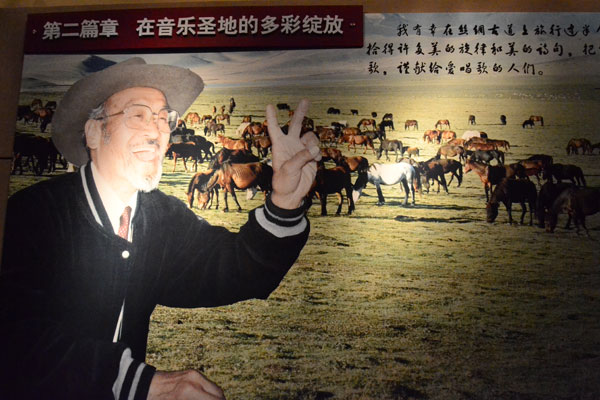

In a far away fairy land,
there is a fairy girl.
Everybody who passes by her tent
will go back and linger around there.
She gets pink-cheek face with her smile
like a glory sun,
and her eyes are charming and pretty
like a moon that shinning in the midnight.
I would give up my property,
and go to graze with her.
Looking at her face with a smile
and her dress with golden-lace works.
I'd become a tiny lamb
running by her side,
let her always swing her whips
flipping tenderly on my body.
(by Wang Luobin, Chinese folk song composer)
 |
|
A picture of Wang Luobin posted at the Wang Luobin Music Art Gallery, in Haibei Tibet autonomous region, Northwest China’s Qinghai province, Aug 9, 2013. [Photo/chinadaily.com.cn] |
Wang Luobin (1913-1996) is a renowned musician whose works were inspired by ethnic groups in West China.
His trips to Northwest China in the 1930s changed his life and contributed to his songwriting. Known as the "Father of Chinese Folk Music", or the "King of West China Songs", he collected and adapted more than 700 songs into eight albums, which became very popular not only in China. His classic songs, such as The Girl from Daban City and Raise Your Kerchief, have been performed by many singers.
Wang lived in Qinghai for more than a decade in the 1930s and 1940s, during which he wrote some of his best-known pieces, including In a Far Away Fairy Land and The Crescent Moon Rises.
During a movie project in 1939, Wang fell in love with a 17-year-old Tibetan girl named Droma. The love match didn't lead to marriage, but Wang created the widely popular love song In a Far Away Fairy Land.













